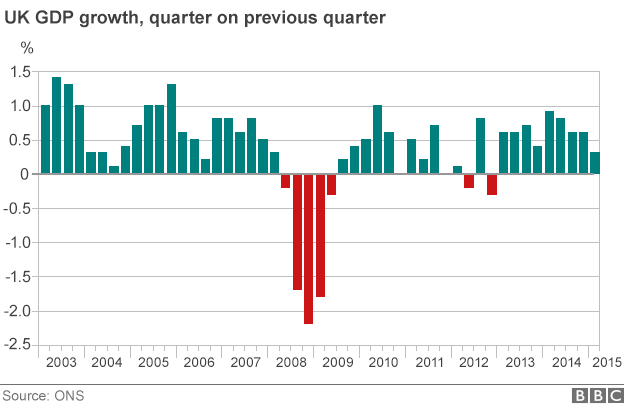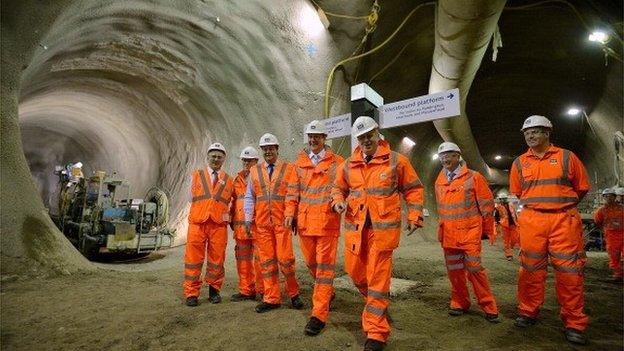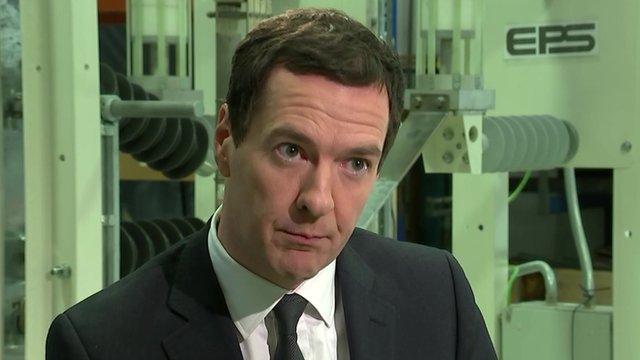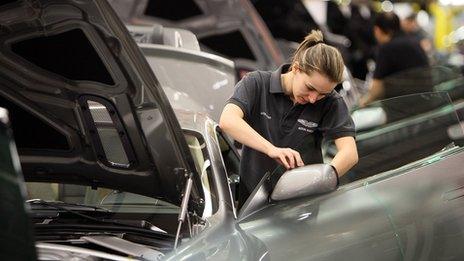UK economic growth slows to 0.3%
- Published
Chancellor George Osborne says we have reached a 'critical moment'
The rate of economic growth halved in the three months to the end of March, official figures show, marking the slowest quarterly growth for two years.
The UK economy grew by 0.3% in the quarter, the Office for National Statistics (ONS) said., external
That compares with 0.6% in the last three months of 2014.
The figures, which come nine days before the general election, suggest a "temporary" slowdown in the economy, analysts said.
The ONS said the economy was 2.4% larger than the same period a year earlier.
Growth of 0.5% in the services industry was offset by a 1.6% fall in the pace of economic output in construction.
The UK services sector accounts for around three quarters of economic growth, with construction, manufacturing and production accounting for the remaining quarter.

'Critical moment'
The Chancellor, George Osborne, said: "It's good news that the economy has continued to grow, but we have reached a critical moment. Today is a reminder that you can't take the recovery for granted and the future of our economy is on the ballot paper at this election."
But Labour's shadow chancellor, Ed Balls, said: "While the Tories have spent months patting themselves on the back these figures show they have not fixed the economy for working families."
Liberal Democrat Chief Secretary to the Treasury Danny Alexander, said the figures were still progress but a warning too.
He added it was vital his party were part of the next government to ensure the "fair and balanced approach needed to secure this recovery".
Labour and Lib Dem reaction to the slowing in UK growth
Scottish National Party (SNP) finance spokesman and Scottish Finance Minister John Swinney said the growth figures demonstrated the need for the "end of austerity and for greater investment in the economy".
"The lesson I take from that is that we have a chance in the election next Thursday to start to invest again in our economy by ending the austerity and spending cuts of the UK government," he said.
Vicky Redwood, chief UK economist at Capital Economics, said the figures would not help the coalition parties with just nine days to go until the general election.
But she added the slowdown in the economy "should just be temporary" and that quarterly economic growth should return to between 0.7% and 0.8% later in the year.

Despite big infrastructure projects such as Crossrail, construction output fell 1.6% in the first quarter

Analysis: Robert Peston, BBC economics editor
For reasons no one can quite explain, construction in Britain has been lousy for six months.
The production industries have been especially hurt by the oil price collapse, which has led to something of a crisis in the North Sea. Excluding oil and gas, quarter-on-quarter growth would have been 0.1 of a percentage point higher at 0.4%.
But nor has manufacturing been sparkling: it showed growth of just 0.1%. And perhaps because of the strengthening pound, the growth rate of our manufacturers has progressively decelerated in a straight line from 1.4% a year ago
More unexpectedly, some service industries in which the UK is a world leader - finance, engineering and architecture - have had a poor few months.
One possible explanation of their slowing growth is that demand for our services and goods in important export markets - especially China and the US - may be a bit worse than official figures show. That could be a sign of trouble ahead.
So thank goodness for our domestic-facing services.
Or to put it another way, if we weren't a nation of shoppers and restaurant eaters, there would be very little growth at all. The output of distribution, hotels and restaurants increased by 1.2% in the quarter - only slightly slower than at the end of last year.

The figures represent a first estimate of economic growth and are based on less than half of the total data required for the final output estimate.
But the ONS said that while estimates are subject to revision as more data become available, the revisions are typically small between the preliminary and third estimates.
ONS chief economist Joe Grice said: "The economy expanded a little more slowly in the first quarter of 2015 than we've seen in the past two years and that's largely due to the services sector, where growth has eased to 0.5%.
"In addition, there has been a further fall in construction output that itself takes around 0.1% off the GDP growth rate. But, as always, we warn against reading too much into one quarter's figures."
- Published28 April 2015
- Published28 April 2015

- Published28 April 2015

- Published20 April 2015
